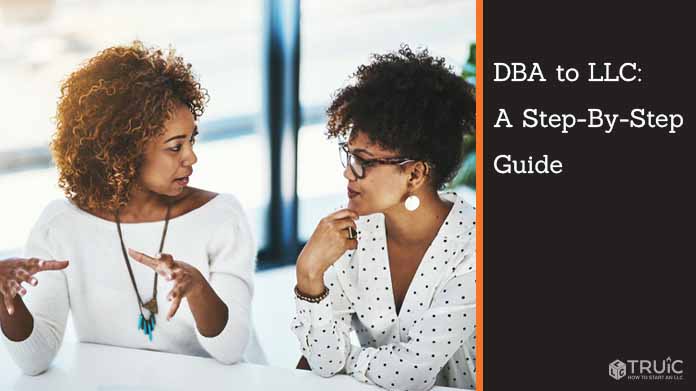DBA to LLC
Converting your DBA to an LLC will protect your personal assets and allow you to grow your small business.
Read ahead to learn about the benefits of a DBA vs LLC and the steps to form an LLC.

Convert a DBA to an LLC
While changing your business from a DBA (sole proprietorship) to an LLC isn’t an overly complicated process, it’s important to follow the correct steps to forming an LLC.
A doing business as name (DBA) isn't a business structure—it's a brand name for a business. Many business owners use the term DBA to mean sole proprietorship but they are actually two different things. We will use both terms in this guide.
Steps to Changing Your DBA to an LLC:
1. Determine If You Can Use Your DBA Name
States require LLCs to have a name that no other registered business uses. You will need to search for your new LLC name to make sure it is unique.
Assuming you have a doing business as (DBA) name for your sole proprietorship, your existing business name must meet all of your state’s requirements for an LLC. You also need to convert or cancel your DBA registration before filing the Articles of Organization for your new LLC.
You can search business names and learn more about your state's guidelines on our Form an LLC guides.
2. Choose a Registered Agent
A registered agent is an individual or business entity responsible for receiving important legal documents on behalf of your business. A member of your LLC may act as a registered agent or you can hire a professional service to fill this role.
While hiring a registered agent service incurs an additional expense, it offers several advantages from increased privacy and convenience to peace of mind.
3. Register Your New LLC With the State
While the LLC registration process varies from state to state, typically you must complete and file the Articles of Organization (or a similarly named document) and pay a filing fee. Depending on the state, you can complete this process online or by mail.
You can use our Form an LLC guides to access the Articles of Organization for your state.
4. Obtain an EIN
The U.S. government uses an employer identification number (EIN) to identify your business. You need it to file taxes, open a bank account, and hire employees. You can obtain an EIN from the Internal Revenue Service for free.
5. Open a New Bank Account
To ensure you enjoy the liability protection provided by an LLC, you need to open an entirely new bank account for your new business. You could face financial risk if you continue using an account you previously opened for your DBA. You’ll also want to ensure you make the necessary changes to any vendor accounts, business credit cards, etc. Find the bank that suits all your business banking needs with our Best Banks for Small Business review.
6. Dissolve Your DBA
You must also properly dissolve your DBA (sole proprietorship) with the state or local government with which you originally registered. This process varies by location so check in with your business registration authority.
7. Make Other Final Changes
Once you complete the transition to an LLC, be sure to update your company website, business listings, letterhead, business cards, social media channels, and any other place that may contain outdated information about your business.
Benefits of Changing a DBA to an LLC
There are 4 main benefits of changing a DBA (sole proprietorship) to an LLC:
- Liability Protection
- Privacy
- Credibility
- Branding
Limited Liability
The primary benefit of changing from a DBA (sole proprietorship) to an LLC is the liability protection LLCs offer. As a DBA (sole proprietorship), your personal finances (e.g., bank accounts, automobiles, real estate) could be at risk if your business incurs debt or must pay damages stemming from a lawsuit — even if you have separate personal and business accounts. An LLC legally separates the business from the owner and protects personal assets.
Privacy
LLCs also provide more privacy than a DBA (sole proprietorship), allowing owners to more easily keep their identity secret if they choose to do so.
Credibility
Another benefit of an LLC structure is that it can make your business look more professional and credible, potentially helping you gain clients or drive sales. Additionally, if you need to raise capital or decide to sell your business, it’s much easier to do both as an LLC than as a DBA (sole proprietorship).
Branding
LLC owners can use the LLCs legal name as their brand name. A DBA (sole proprietorship) must use a doing business as name (DBA) to avoid using their own surnames as their business name.


